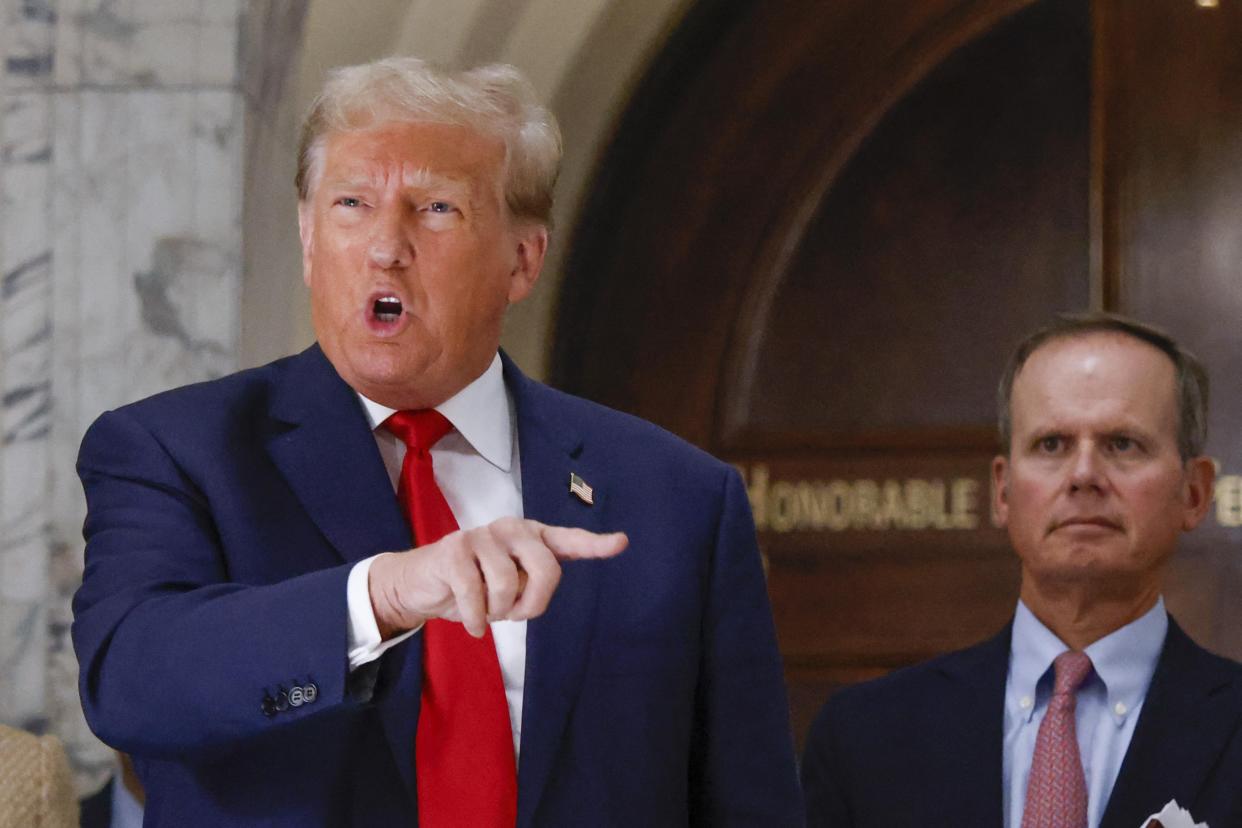The Most “Heads I Win, Tails You Lose” Trump Argument Ever

- Oops!Something went wrong.Please try again later.
On Thursday, Donald Trump’s attorneys filed their long-awaited motion seeking to dismiss special counsel Jack Smith’s Jan. 6 prosecution, citing what they claim is Trump’s “absolute immunity” from prosecution for acts committed as president, because he was president.
As Norm Eisen and Joshua Kolb have explained in Slate, this motion should be largely ignored, since the immunity claims have already been rejected in various forms in numerous courts. But it’s worth considering this point of view philosophically as well as legally. Because Trump’s argument—which boils down to the president’s attorneys claiming he was acting for what he thought was the good of the country when he sparked a mob assault on the Capitol in an attempt to overturn a free and fair election—deserves to be laughed out of court and out of societal discourse.
At the same time, one particular portion of Trump’s motion to dismiss is so utterly shameless that it deserves special attention. The argument that should take the prize for the greatest piece of legal chutzpah ever presented by a Trump lawyer in a court of law—and that is saying a lot—comes on Page 11 of the 46-page motion to dismiss. There, Trump’s attorneys argue that the Constitution itself gives him immunity because it specifies that impeachment may be followed by a criminal indictment. Trump’s attorneys reason, therefore, that an acquitted president, such as Trump, can no longer face indictment. See for yourself:
Presidential immunity from criminal prosecution for official acts is also rooted in the text of the Constitution. The Impeachment Clauses provide that the President may be charged by indictment only in cases where the President has been impeached and convicted by trial in the Senate. Here, President Trump was acquitted by the Senate for the same course of conduct.
The Impeachment Clause of Article I provides that “Judgment in Cases of Impeachment shall not extend further than to removal from Office … but the Party convicted shall nevertheless be liable and subject to Indictment, Trial, Judgment and Punishment, according to Law.” … Because the Constitution specifies that only “the Party convicted” by trial in the Senate may be “liable and subject to Indictment, Trial, Judgment and Punishment,” … it presupposes that a President who is not convicted may not be subject to criminal prosecution.
This is silly on its face: Just because the Constitution says that one thing can happen (an impeached and convicted president can face prosecution), that doesn’t imply that the inverse cannot happen (an impeached and acquitted president can’t face prosecution).
What is much more galling, though, than this logical error is that during the impeachment trial over the events of Jan. 6, Trump’s lawyers argued the exact opposite in order to win acquittal. Specifically, Trump attorney David Schoen said during that impeachment trial that the Senate could not convict Trump because, since he was no longer president, the only appropriate venue for accountability was the criminal justice system. Schoen went so far as to explicitly cite the very same section of the Constitution to say the exact opposite thing now being argued in court. Here’s what Schoen argued (emphasis mine):
[The impeachment managers] contend, citing various law professors, that ‘‘[any official] who betrayed the public trust and was impeached could avoid accountability simply by resigning one minute before the Senate’s final conviction vote.’’
This argument is a complete canard. The Constitution expressly provides in article I, section 3, clause 7 that a convicted party, following impeachment, ‘‘shall nevertheless be liable and subject to indictment, trial, judgment, and punishment according to law’’ [after removal]. Clearly, a former civil officer who is not impeached is subject to the same.
Schoen continued by explicitly discussing the prospect of a prosecution, saying that it was the only “appropriate” form of “accountability” for the former president, who was not “immune”:
We have a judicial process in this country. We have an investigative process in this country to which no former officeholder is immune. That is the process that should be running its course. That is the process the bill of attainder tells us is the appropriate one for investigation, prosecution, and punishment, with all of the attributes of that branch. We are missing it by two articles here that the article III courts provide. They provide that kind of appropriate adjudication. That is accountability.
There are appropriate mechanisms in place for full and meaningful accountability not through the legislature, which does not and cannot offer the safeguards of the judicial system, which every private citizen is constitutionally entitled to.
This was not a small part of Trump’s impeachment trial. It’s the argument that probably led directly to his acquittal, with Senate Minority Leader Mitch McConnell citing it as his reason for voting against conviction. In explaining his vote not to convict, McConnell said the appropriate place for accountability was the criminal courts:
President Trump is still liable for everything he did while he was in office, as an ordinary citizen—unless the statute of limitations is run, still liable for everything he did while he was in office. He didn’t get away with anything yet. Yet. We have a criminal justice system in this country. We have civil litigation, and former presidents are not immune from being accountable by either one.
Trump fell just 10 votes short of conviction, and McConnell’s backing clearly carried enormous weight.
Now Trump’s attorneys, having successfully argued that he couldn’t be convicted during his impeachment because the criminal courts were the only appropriate venue, are arguing that he can’t be held accountable in criminal court because he wasn’t convicted during his impeachment.
There is, it’s worth noting, an entire legal principle called estoppel, which prevents someone from claiming in court something contrary to a case that they made to win a previous argument in court. Judge Tanya Chutkan should consider deploying it.

